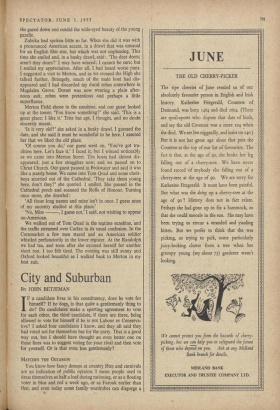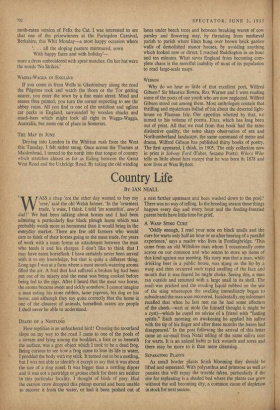City and Suburban
By JOHN BETJEMAN IF a candidate lives in his constituency, does he vote for himself? If he does, is that quite a gentlemanly thing to do? Do candidates make a sporting agreement to vote for each other, the third candidate, if there are three, being allowed to vote for himself if he is not Labour or Conserva- tive? I asked four candidates I know, and they all said they had voted not for themselves but for the party. That is a good way out, but I should have thought an even better one on those lines was to suggest voting for your rival and then vote for yourself. Or is that even less gentlemanly?
MATCHES THE OCCASION You know how fancy dresses at country fetes and carnivals are an indication of public opinion. I mean people used to dress themselves as half a loaf during rationing, or as a floating voter in blue and red a week ago, or as Farouk earlier than that, and even today some family wardrobes can disgorge a moth-eaten version of Felix the Cat. I was interested to see that one of the prizewinners at the Faringdon Carnival, Berkshire, this Whit Monday—a most happy occasion where . . all the sloping pasture murmured, sown With happy faces and with holiday'— wore a dress embroidered with spent matches. On her hat were the words 'No Strikes.'
WAGGA-WAGGA IN ENGLAND
If you come in from Wells to Glastonbury along the road the Pilgrims took and watch the thorn or the Tor getting nearer, you enter the town by a fine main street. Mind and senses thus primed, you turn the corner expecting to see the abbey ruins. All you find is one of the untidiest and ugliest car parks in England, surrounded by wooden shacks and snack-bars which might look all right in Wagga-Wagga, Australia, but seem out of place in Somerset.
THE MAP ' IN JUNE
Driving into London in the Whitsun rush from the West this Tuesday, I felt rather smug. Once across the Thames at Maidenhead, I turned to the north into that tongue of country which stretches almost as far as Ealing between the Great West Road and the Uxbridge Road. By taking the old winding lanes under beech trees and between breaking waves of cow parsley and flowering may, by threading from medieval parish to parish where lilacs hung over brown brick garden walls of demolished manor houses, by avoiding anything which looked new or direct, I reached Paddington in an hour and ten minutes. What saves England from becoming com- plete chaos is the merciful inability of most of its population to read large-scale maps.
WIBSON
Why do we hear so little of that excellent poet, Wilfred Gibson? Sir Maurice Bowra, Rex Warner and 1 were reading some of the poets of our youth who are now neglected. Wilfred Gibson stood out among them. Most anthologies contain that thrilling and mysterious ballad of his about the deserted light- house on Flannan Isle. Our appetites whetted by that. we turned to his volume of poems, Fires, which has long been out of print. All that we read from that book had the same distinctive quality, the same sharp observation of sea and Northumberland landscape, the same command of metre and drama. Wilfred Gibson has published thirty books of poetry. The first appeared, I think, in 1905. The only collection now in print is Solway Ford (Faber, Sesame Poets). Who's Who tells us little about him except that he was born l 1878 and now lives at West Byfleet.



































 Previous page
Previous page